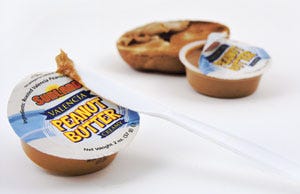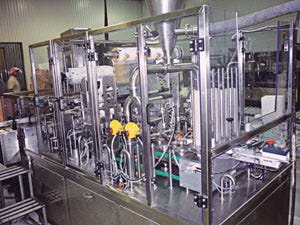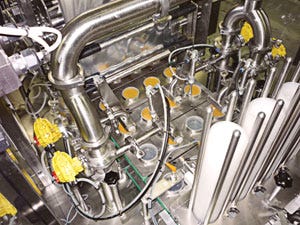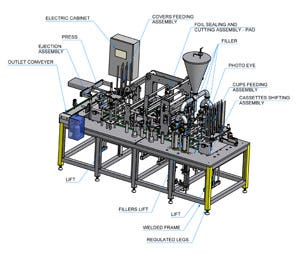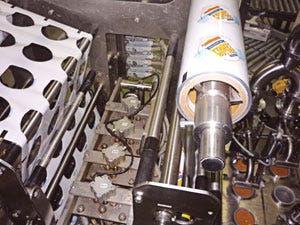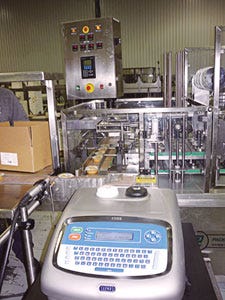Packing peanut butter cups pronto
|
Sunland, Inc., Portales, NM, was formed in 1988 by a group of dedicated peanut farmers in eastern New Mexico to grow and market the naturally sweet and dense Valencia peanut that is unique to the area. Valencias, which are smaller, sweeter and have more intense flavor than other varieties of peanuts, are grown almost exclusively in eastern New Mexico. In fact, 90 percent of the Valencia peanuts produced in the U.S. are grown within 120 miles of Portales, which claims the honor of being the “Valencia Peanut Basin of the Nation.”
Sunland is a vertically-integrated peanut processor/manufacturer that specializes in Valencia peanuts and organic peanuts of all varieties. It processes 80 percent of all Valencia peanuts and 92 percent of all U.S.-grown organic peanuts. Last March, Sunland introduced 2-oz cups of peanut butter packed in 6-unit paperboard sleeves and 24-pack cartons.
|
Pneumatic cylinders push the 2-oz cups through the intermittent-motion form/fill machine rather than transporting them on a conveyor. |
“We found that there is high demand for this type of healthy food in a convenient, shelf-stable form,” says vp Katalin Coburn. “The 2-oz individual package size provides an ample amount of nutrition for all types of caloric-intake needs.”
Pneumatically operated machine
Sunland worked with ZestNet (www.zest.net) to design the packaging. The cup, which is supplied by the Rampart Div. of Printpack, Inc. (www.printpack.com), is made from a three-layer lamination of PP, ethylene vinyl alcohol (EVOH) and PP. To run the cups, Sunland installed an Israeli-made Model PXG-4 horizontal filling/sealing machine that is marketed in the U.S. by Pack Line West. (www.packlinewest.com). This is an intermittent-motion, four-up machine that runs about 100 cups/min.
|
Peanut butter is pumped from an overhead hopper into the four filling heads, where air-operated pistons dispense the product through nozzles into the cups. |
“We considered a number of machines, but the Pack Line seemed best suited to our needs,” says Weston Pierce, peanut butter plant manager. “Unlike other machines on the market, the Pack Line is powered pneumatically rather than electrically, and it's very rugged. In addition, the individual plates carrying the cups can easily be removed from the machine, so it only takes a few minutes to change from one size cup to another.”
As mentioned by Pierce, each row of cups is carried by an individual carrier plate that rides through the machine on two steel rails. At each machine cycle, a horizontal air cylinder pushes a carrier plate into the machine, and at each subsequent cycle, the plate is pushed further through the machine by the plates behind it. A sensor detects that a plate is present and that it is aligned properly. If there is a problem, the sensor shuts down the machine.
To start the operation, an operator loads the plastic cups into four vertical dispensers consisting of vertical metal rods. Four cups are dropped into cavities in the carrier plate at each machine cycle. Sensors detect if a cavity is empty, and tell the machine not to fill or attempt to attach a lid at that position. The cups are conveyed to the two-stage filling section, where two cups in a row are filled in the first stage and the remaining two cups are filled in the second stage.
Peanut butter is pumped from an overhead hopper into the four filling heads, where air-operated pistons dispense the product through nozzles into the cups. Air-operated valves open and close in concert with the pistons to control product flow. The stroke length of each piston is adjusted individually by a hand wheel to set the discharge quantity. Pack Line is introducing a new product pump that has no valves or moving parts, but it has not disclosed any details.
Seal and cut simultaneously
|
The compact fill/ seal machine is extremely rugged and is easy to change from one size cup to another. |
The cups next are conveyed to the sealing section of the machine, where lidding film is heat sealed to the top of the cups. The PE, easy-peel lid film, which is supplied by Legend Packaging Group (www.legendintl.com), is rotogravure reverse-printed in six colors and includes a peelable polyolefin sealant. A roll of the film is mounted above the machine and the film is pulled down across the sealing section where an air-operated press descends and heat seals the film to the tops of the cups, while circular knives attached to the seal heads simultaneously cut the four individual lids from the web of film.
The waste film is rolled onto a shaft on top of the machine. A sensor detects an eye mark on the film between each row of tops to ensure that they are aligned properly.
The machine is equipped with a lid dispenser consisting of four sets of vertical metal rods from which plastic lids drop onto the cups and are pressed down tightly in the next station. Sunland is not using this feature. The filled and sealed cups are transported to the discharge section, where pistons lift them from the cavities and a horizontal rake pushes them onto a discharge conveyor.
Carriers repeat cycle
The empty carrier plate drops onto a double set of rails at a lower level in the machine and is pushed to the front of the machine. At this point, a piston lifts the plate to the main level of the machine, where it is pushed into the machine and repeats the cycle.
The machine is controlled by an Allen-Bradley PLC and HMI from Rockwell Automation (www.rockwellautomation.com). Kanthea Consulting, (www.kanthea.com) assisted on this project.
As the cups leave the filler/sealer, a Linx 4900 ink-jet printer from Diagraph, an ITW company (www.diagraph.com) applies a best-by date and fill time to the sides of the cups. The cups are hand-loaded into 24-pack cartons and six-pack paperboard sleeves for distribution. The 4-color, litho-printed paperboard sleeves are supplied by Graphic Packaging, Intl. (www.graphicpkg.com).
“The Pack Line machine has worked out very well for us, and they have given us excellent service,” says Pierce.
|
|
An air-operated press descends and heat seals the film to the top of the cups, while circular knives attached to the seal heads simultaneously cut the individual lids from the web film. | As the cups leave the filler/sealer, an ink-jet printer applies the time the product was filled and the best-by date to the side of the cups. |
More information is available: |
Diagraph, an ITW company, 800/722-1125. www.diagraph.com. |
Graphic Packaging International, Inc., 1-800-677-2886. www.graphicpkg.com |
Kanthea Consulting, 714/692-0092. www.kanthea.com. |
Legend Packaging Group, 909/392-0213. www.legendintl.com. |
Pack Line West, 909/392-8000. www.packlinewest.com. |
Printpack, Inc., 404/460-7529. www.printpack.com. |
Rockwell Automation, 414/382-2000. www.rockwellautomation.com. |
About the Author(s)
You May Also Like
